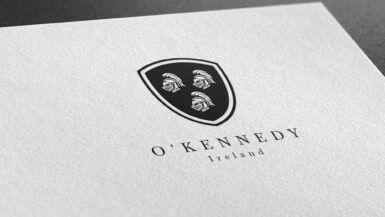The MacAuliffe surname heralds from the ancient lands of Ireland, a name etched in Gaelic traditions. The original Gaelic form of the name is “Mac Amhlaoibh”, which means “son of Amhlaoibh” or “son of Auliffe”. The name Amhlaoibh itself is derived from the Old Norse name “Óláfr”, which made its way to Ireland through Viking interactions and settlements.
Etymology and Meaning
“Óláfr”, the root of Amhlaoibh, translates to “ancestor’s relic”, drawing a link between past generations and their descendants. This connection with ancestry speaks to the reverence the Celts held for their forebearers and the importance of lineage in Gaelic culture.
Earliest Known Usage
The MacAuliffe name traces its earliest mentions to medieval Irish records, where individuals bearing the name played roles both minor and major in the evolving tapestry of Ireland’s history.
Geographic Distribution
Historically, the MacAuliffe clan was strongly associated with County Cork in the southwest of Ireland. Within this county, they held territories, primarily around the modern-day town of Macroom.
Original Geographic Location
County Cork, with its lush landscapes and significant historical landmarks, served as the heartland for the MacAuliffe clan. Their seat of power in this region signified their stature and influence during various epochs of Irish history.
Migration Patterns
Like many Irish clans, the MacAuliffes faced a series of adversities, from political subjugation to socio-economic hardships, leading many of its members to seek greener pastures abroad. The United States, Canada, Australia, and parts of the UK became new homes for many MacAuliffes, especially during and after the Great Famine.
Historical Context
Notable Historical Events
The MacAuliffes, due to their position in County Cork, were privy to various significant events in Irish history. From the Norman invasions to the struggles against English rule, their destiny was intertwined with the broader historical currents of Ireland.
Notable Irish Bearers of the Surname
Famous Individuals
- Max MacAuliffe (1841–1913) – A renowned scholar, MacAuliffe is best known for his works on Sikhism. Though born in Ireland, his most significant contributions were his translations of Sikh scriptures and writings on Sikh history.
Influential Figures
Over the centuries, numerous MacAuliffes have made their mark in various fields, contributing to the arts, sciences, politics, and more, both within Ireland and in their adopted homes abroad.
Variations of the Surname
Spelling Variations
The MacAuliffe name, due to its Gaelic origins, regional dialects, and the Anglicization process, has multiple spellings. Some variations include McAuliffe, McCauliffe, and even Caullife in some regions.
Regional Differences
While County Cork remains the historical and cultural epicenter for the MacAuliffe name, regional variations emerged as the name spread across Ireland and overseas, adapting to local pronunciations and spellings.
Current Statistics and Distribution
Frequency and Global Distribution
Today, the MacAuliffe surname is globally represented, thanks to the vast Irish diaspora. While Ireland remains the heart of the MacAuliffe identity, significant populations can be found in countries like the United States, Australia, and the UK.
Changes Over Time
From a strong Gaelic clan in County Cork to a global family name, the MacAuliffe identity has seen significant evolution. Still, through all changes, the essence and connection to their Irish roots remain unyielding.
Family Coat of Arms
The MacAuliffe coat of arms traditionally depicts a red shield with a silver hand holding a blue serpent. Above the shield, a silver helmet with a wreath and mantling of red and silver, and the motto “Fortis et hospitalis” meaning “Brave and hospitable” complements the clan’s historical ethos.






Leave a reply